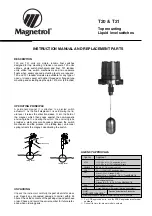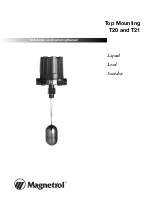
Chapter 8 Basic Setting
GS1350 Series User’s Guide
91
Use Time Server
when Bootup
Enter the time service protocol that your time server uses. Not all time servers support all
protocols, so you may have to use trial and error to find a protocol that works. The main
differences between them are the time format.
When you select the
Daytime (RFC 867)
format, the Switch displays the day, month, year and
time with no time zone adjustment. When you use this format it is recommended that you use a
Daytime timeserver within your geographical time zone.
Time (RFC-868)
format displays a 4-byte integer giving the total number of seconds since 1970/
1/1 at 0:0:0.
NTP (RFC-1305)
is similar to
Time (RFC-868)
.
None
is the default value. Enter the time manually. Each time you turn on the Switch, the time
and date will be reset to 1970-1-1 0:0:0.
Time Server IP
Address
Enter the IP address or domain name of your timeserver. The Switch searches for the timeserver
for up to 60 seconds.
Time Server Sync
Interval
Enter the period in minutes between each time server synchronization. The Switch checks the
time server after every synchronization interval.
Current Time
This field displays the time you open this menu (or refresh the menu).
New Time
(hh:min:ss)
Enter the new time in hour, minute and second format. The new time then appears in the
Current Time
field after you click
Apply
.
Current Date
This field displays the date you open this menu.
New Date (yyyy-
mm-dd)
Enter the new date in year, month and day format. The new date then appears in the
Current
Date
field after you click
Apply
.
Time Zone
Select the time difference between UTC (Universal Time Coordinated, formerly known as GMT,
Greenwich Mean Time) and your time zone from the drop-down list box.
Daylight Saving
Time
Daylight saving is a period from late spring to early fall when many countries set their clocks
ahead of normal local time by one hour to give more daytime light in the evening.
Select this option if you use Daylight Saving Time.
Start Date
Configure the day and time when Daylight Saving Time starts if you selected
Daylight Saving
Time
. The time is displayed in the 24 hour format. Here are a couple of examples:
Daylight Saving Time starts in most parts of the United States on the second Sunday of March.
Each time zone in the United States starts using Daylight Saving Time at 2 A.M. local time. So in
the United States you would select
Second
,
Sunday
,
March
and
2:00
.
Daylight Saving Time starts in the European Union on the last Sunday of March. All of the time
zones in the European Union start using Daylight Saving Time at the same moment (1 A.M. GMT
or UTC). So in the European Union you would select
Last
,
Sunday
,
March
and the last field
depends on your time zone. In Germany for instance, you would select
2:00
because
Germany's time zone is one hour ahead of GMT or UTC (GMT+1).
End Date
Configure the day and time when Daylight Saving Time ends if you selected
Daylight Saving
Time
. The time field uses the 24 hour format. Here are a couple of examples:
Daylight Saving Time ends in the United States on the first Sunday of November. Each time
zone in the United States stops using Daylight Saving Time at 2 A.M. local time. So in the United
States you would select
First
,
Sunday
,
November
and
2:00
.
Daylight Saving Time ends in the European Union on the last Sunday of October. All of the time
zones in the European Union stop using Daylight Saving Time at the same moment (1 A.M. GMT
or UTC). So in the European Union you would select
Last
,
Sunday
,
October
and the last field
depends on your time zone. In Germany for instance, you would select
2:00
because
Germany's time zone is one hour ahead of GMT or UTC (GMT+1).
Table 25 Basic Setting > General Setup (continued)
LABEL
DESCRIPTION
















































